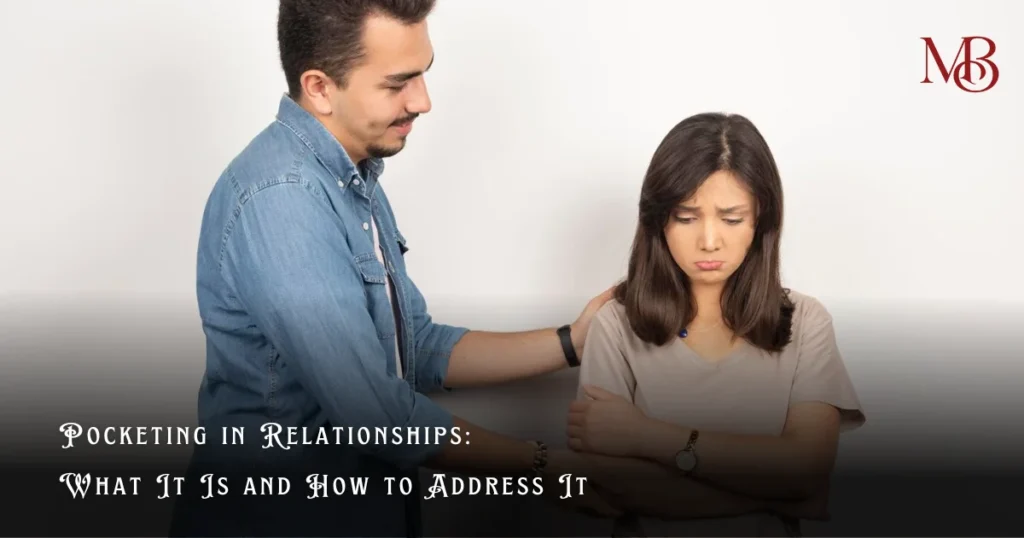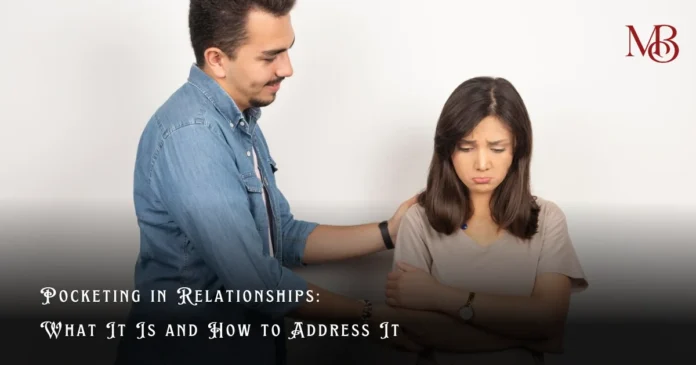What is Pocketing in Relationships? The terms “ghosting” and “breadcrumbing” are pretty familiar in the modern dating sphere, but there is another, less discussed yet equally problematic phenomenon that has been defined as pocketing. If you ever feel that your partner is hiding your relationship from their world, then, yes, this pertains to your situation. Pocketing can leave you feeling devalued, uncertain, and wondering what the future of your relationship looks like. So, what is pocketing, why does it happen, and how should you handle it?
We’ll unpack pocketing in relationships with this blog, its potential impact, and how to get out of this very tricky situation in your relationship.

What is Pocketing in Relationships?
Pocketing in relationships is a behavior where the kept one is never introduced to his or her partner’s social circle—the family, friends, and sometimes colleagues. Just as privacy is vital in relationships, pocketing oversteps discretion and flies into secrecy.
Usually, the person pocketed feels that they are being hidden away and that the relationship isn’t acknowledged. It results in feelings of insecurity, loss of trust, and frustration especially if the relationship has been going on for a long time.
Pocketing in Relationships Signs
Pocketing may be very subtle. However, there are common signs that might indicate you’re going through pocketing in relationships:
1. No introduction to family or friends: If your boyfriend never introduces you to his close family and friends after dating them for months, then this is a cause for alarm. Healthy relationships always involve the meeting of close people.
2. Avoiding public appearances: Does your partner avoid going out with you to public places where they will likely see people they know? This can be a potential sign that they are trying to maintain a low profile of the relationship.
3. Less or No Social Media Activity: Not everyone is on social networking sites or blogs; however, if your partner is pretty active on sites like Facebook, Twitter, or other ones but never mentions or shares anything with you, then it can be pocketing.
4. Excuse for Family Get-Togethers: When your partner always finds reasons for you to not attend family events or any get-together, then that may be pocketing.
5. No future plans: A man who does not want to talk about the future plans with you or exclude you from most of the long-term decisions, he has his own reasons for not making the whole seriousness of the relationship evident.
Why men Pocket?
Pocketing in Relationships is Not Always Evil in Intent.
The reasons behind the act of pocketing vary from one individual to another, depending on either personal issues, cultural factors, or relationship problems among others. Here are the main causes of pocketing:
1. Fear of commitment: There are people who are not ready to have a meaningful relationship. You hide them from everyone because integrating you into their lives in its entirety would put pressure on committing to the real sense of attachment.
2. Embarrassment or insecurity: Sometimes, a person might feel insecure about their partner or the relationship itself. The basic reasons can be about embarrassing certain things in the relationships, like age gap, socioeconomic status, or even personal inadequacies.
3. Coercion by family or social: The pocketing could occur because of coercion through either social or family expectations. For example, the date or time to marry becomes anticipated within one’s community or religion; they might keep the relationship hidden in order not to face the family or the social norms.
4. Uncertainty over the future relationship: In some instances, pocketing happens due to uncertainty in a person’s future relationship. Maybe they don’t want you to meet the family members and friends until they get an idea about how their relationship is going to be oriented.
5. Multiple relationships or dishonesty: In some extreme cases, pocketing may be a sign of dishonesty, for example, infidelity. Maybe he or she is dating many others or playing a double life and hides one partner from the other circles of his life.
Impact of Pocketing in a Relationships On You
Being pocketed can seriously dent the emotional self-esteem. In the long run, it could slowly chip away at your self-esteem and make you question how much of a value you have in the relationship. This are a few ways pocketing can impact your mental and emotional well-being:
You will also end up insecure because you don’t know other important aspects in your partner’s life. You might start asking yourself why you could not be introduced to your partner’s friends or family members.
Pocketing creates a threat about trust issues. You might become suspicious or anxious why your partner hides you in this silent pocketing world, therefore causing stress in your relationship.
Undervalued: Often, the feeling related to pocketing is being undervalued. Your partner not acknowledging your relationship publicly may give the feeling that you are unimportant in the eyes of him.
Emotional distance: Hiding your relationship will eventually create an emotional distance with your partner. This is rather hard when you feel connected, not fully included in all aspects of life.
How to Handle Pocketing in Relationships With These 4 Tips
If you feel pocketed, talk the matter out with your partner, candidly. Here are steps to take:
1. Open Discussion
Talk openly with your partner about your feelings. Let them know how you feel and why they haven’t introduced you to their close circle of individuals. Do not use accusatory language; use such words to let them know how their actions make you feel.
For instance, you may say: “I have noticed that I haven’t met your friends or family yet, and it is really starting to make me feel like our relationship isn’t important. Can we discuss why this is?”
2. Be Patient, But Set Boundaries
Sometimes, people have good reason for not wanting to introduce their partner to family and friends right away. Perhaps there is an urge to wait until they feel safe in the relationship. If that is the case, be patient, but put a timeline or boundaries in place. Let them know that you understand, but you need some clarity about when those introductions might happen.
3. Relationship Evaluation
If your partner sidesteps talking about the issue or continues to make you stay behind closed doors for no valid reasons at all, then it is the moment to take a critical look at where this relationship is leading. Ask yourself if you can continue living in secret forever. Well, if no, then probably it’s the time to determine whether this is the right relationship for you.
4. Seek Professional Help
Looking for a relationship counselor or therapist could be helpful if communication breaks down or if pocketing creates an issue that affects your comfort level.
Both partners may become better attuned to the feelings and motivations of the other, thus guiding them toward healthier relationship dynamic.
When you know you are dating the right person, things just work. Never should you let fears creep in. Always, you should step back when the pressures have engulfed you for too long.
Trust Your Instincts
It may also feel confounding, very hurtful, but trust your instincts and let your partner know it. Now there are lots of reasons somebody might pocket you, but this does not mean that in the course of that relationship, you were worthless or insignificant.
You might also like: 6 Reasons Behind the Increase in Divorce Rates in India
Healthy relationships are built on a foundation of trust and openness with mutual respect. If pocketing creates an emotional stress in your relationship, then it is necessary to address the issue head-on. You may speak freely about the situation, set some boundaries for yourself, or you may wish to seek professional help to work on pocketing for a more honest and satisfying relationship with your partner. For more such information follow our culture page.


